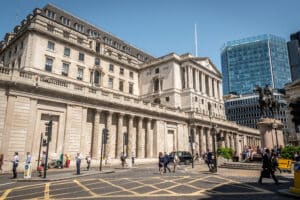
In a significant move to combat high inflation, the Bank of England (BoE) has announced its 14th consecutive interest rate hike, pushing rates to a fresh 15-year high of 5.25%.
This decision comes as the central bank strives to bring down inflation and steer the UK economy towards stability. While economists predicted a 0.25 percentage point increase, some experts speculated the possibility of a larger hike, similar to the unexpected 0.5 percentage point rise in June. This article delves into the factors driving the BoE’s decision, the impact on borrowers and savers, and the potential consequences for the housing market and wider economy.
The decision to raise interest rates is driven by the BoE’s commitment to curbing high inflation and returning it to the target rate of 2%. Governor Andrew Bailey believes that increasing rates will contribute to this goal. However, critics argue that it may not be the most effective strategy. The June rate hike was prompted by inflation remaining high at 8.7% in the year leading up to May. Despite a slight drop to 7.9% in June, inflation remains significantly above the target rate. The BoE aims to ensure that inflation falls back to the desired level, thereby safeguarding the economy.
Impact on Borrowers and Savers
As interest rates rise, borrowing costs increase for individuals and businesses alike. This includes higher monthly mortgage payments for homeowners, potentially leading to a rise in rents for tenants. However, the hike should benefit savers, as they can expect better rates on their savings. Nonetheless, concerns have been raised regarding banks not fully passing on these benefits to customers. This disparity between borrowing and saving rates may have implications for financial institutions and their relationships with customers.
The Housing Market and Economic Implications
The MPC’s decision will have a significant impact on the housing market and the wider economy. The recent decline of 3.8% in property values in July, the largest drop in 14 years, has been attributed to dampened demand caused by stretched affordability for mortgages. Higher interest rates could further suppress the housing market, potentially leading to a slowdown in economic growth. Economists are closely monitoring the situation, as fears of a recession loom if the UK fails to navigate the effects of rising rates effectively.
Matt Thompson, head of sales at Chestertons, says: “We expect the rate rise to have a particular impact on homeowners with a variable mortgage as well as overleveraged buy to let investors whose increased mortgage payments could result in their investment making limited profit or a loss. Although there still is a vast number of buyers wanting to move as soon as possible, rising interest rates are forcing house hunters to be more cautious, review their financial situation and calculate a more conservative budget. Whilst this has recently resulted in fewer new buyers entering the market, we expect activity to pick up again once buyers have adjusted their criteria and lenders are bringing more products to the market again.”
The BoE’s Commitment to Inflation Target
Governor Andrew Bailey emphasizes the importance of bringing down inflation to the Bank’s target rate of 2%. The BoE aims to protect the most vulnerable in society, as inflation disproportionately affects those with lower incomes. The central bank’s determination to see inflation return to the desired level underscores its commitment to achieving economic stability. By raising interest rates, the BoE aims to ensure that inflation falls decisively.
Forecasting Inflation and Economic Growth
New projections from the Bank of England predict that UK inflation will drop below 5% in the final months of 2023, allowing Chancellor Rishi Sunak to meet his target of halving inflation by the year’s end. The Bank forecasts Consumer Prices Index (CPI) inflation to fall to 4.9% in the final quarter, with a projection that it will remain above 2% until mid-2025. The recent easing of price rises can be attributed to a decline in international energy prices, expected to reduce the average UK household’s energy bill to below £2,000 per year by October.
Mixed Impact on the Economy
The impact of the rate hike on the UK economy is multifaceted. While rising interest rates may curb inflation, they can also dampen economic growth. The dominant services sector, which covers retail, hospitality, and business and finance, experienced sluggish growth in July, signaling a potential stagnation in the economy. Manufacturing sector bosses have also expressed pessimism, with the sector experiencing a slowdown. The effect on renters, who are already vulnerable due to the housing crisis, is a symptom of the broader challenges facing the UK housing market.
Speaking about the announcement, Joseph Calnan, Corporate FX Dealing Manager, Moneycorp, said: “Today’s decision was likely one of the BoE’s hardest yet. The Committee was facing a perfect storm, with intense pressure from opposing directions. On the one hand, July’s slight drop in inflation, the threat of recession and concerns for households and businesses; but on the other, the imperative to finally get inflation down to 2%.
“While we’re likely now looking at a lower terminal rate than forecasted a few weeks ago, we can’t yet say whether a shallow hike was too dovish too soon. August’s CPI data will give us an early sense, but the reality is the policy decisions of recent months will take far longer to make themselves felt.
“Even if inflation continues to drop, every decision the Bank makes for the next two years will be pivotal in determining how quickly we get our economy back on track.”
Read more:
Bank of England Raises Interest Rates to 5.25%: A Milestone in the Fight Against Inflation





